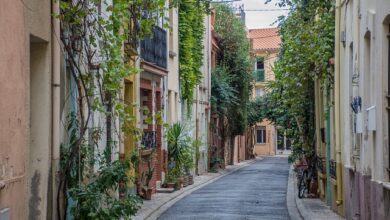How to Find Accommodation in France: Renting vs Buying

France, with its picturesque villages, vibrant cities, and stunning countryside, is a dream destination for many. Whether you’re planning a short-term stay, relocating for work, or considering a permanent move, finding the right accommodation is one of the most important decisions you’ll make. In this article, we’ll explore the two main options for securing housing in France—renting and buying—and provide practical advice on how to navigate each process.
1. Renting in France: Flexibility and Convenience
Renting is often the preferred choice for expats, students, and those who want flexibility without long-term commitments. The rental market in France is diverse, offering everything from chic Parisian apartments to charming countryside cottages. Here’s what you need to know:
Types of Rental Properties
- Furnished Rentals (Meublé): These are fully equipped apartments or houses, ideal for short-term stays or those who prefer convenience. Furnished rentals typically come with essentials like furniture, kitchen appliances, and sometimes even linens.
- Unfurnished Rentals (Non-Meublé): Unfurnished properties are more common for long-term leases. While they may lack basic furnishings, tenants often have more freedom to personalize the space.
- Seasonal Rentals: Popular in tourist areas like Provence, the French Riviera, or ski resorts, these short-term rentals cater to vacationers and seasonal workers.
Finding a Rental Property
- Online Platforms: Websites like SeLoger, LeBonCoin, and Pap.fr are popular resources for searching for rentals. Airbnb also offers longer-term stays in some cases.
- Real Estate Agencies: Working with a local agency can simplify the process, especially if you’re unfamiliar with French rental laws. However, be prepared to pay agency fees, which are usually equivalent to one month’s rent.
- Networking: Word-of-mouth and social media groups (e.g., Facebook expat communities) can help you find hidden gems that aren’t listed online.
Rental Costs and Deposits
- Rent prices vary significantly depending on location. For example, Paris and other major cities tend to be expensive, while rural areas offer more affordable options.
- A security deposit (typically one to two months’ rent) is required for most rentals. Additionally, renters must often provide proof of income or a guarantor to secure a lease.
Pros of Renting
- Flexibility to move or change locations easily.
- Lower upfront costs compared to buying.
- Ideal for short-term stays or uncertain plans.
Cons of Renting
- Limited control over property modifications.
- Rising rents in competitive markets.
- Potential instability due to lease renewals or landlord changes.
2. Buying in France: Investing in Your Future
Purchasing property in France is an attractive option for those seeking stability, investment opportunities, or a second home. With its relatively affordable real estate market (compared to countries like the UK or USA), France has become a hotspot for international buyers. Here’s how to approach buying property:
Steps to Buying Property
- Research the Market: Start by identifying regions that align with your lifestyle preferences and budget. Coastal areas like Brittany and the Côte d’Azur are highly sought after, but smaller towns and rural villages often offer better value.
- Secure Financing: If you need a mortgage, contact French banks or international lenders specializing in French property loans. Non-residents can typically borrow up to 80% of the property’s value.
- Hire a Notary (Notaire): In France, notaries handle all legal aspects of property transactions. They ensure compliance with regulations, conduct title searches, and oversee the transfer of ownership.
- Make an Offer: Once you’ve found your dream property, negotiate the price with the seller. Offers are usually made in writing through your real estate agent or directly to the seller.
- Sign the Contract: After agreeing on terms, you’ll sign a preliminary contract (Compromis de Vente). This legally binds both parties, subject to conditions such as financing approval.
- Finalize the Purchase: Approximately three months later, you’ll sign the final deed (Acte de Vente) in the presence of the notary, completing the transaction.
Buying Costs
- Agency Fees: Typically paid by the buyer, ranging from 5% to 10% of the purchase price.
- Notary Fees: Around 7-8% for existing properties and 2-3% for new builds.
- Additional Expenses: Include property taxes, insurance, and potential renovation costs.
Pros of Buying
- Long-term financial investment with potential appreciation.
- Greater freedom to customize and renovate your property.
- Stability and pride of homeownership.
Cons of Buying
- High upfront costs and ongoing maintenance responsibilities.
- Less flexibility if you decide to relocate.
- Navigating French bureaucracy can be complex for non-French speakers.
3. Renting vs Buying: Which Is Right for You?
Choosing between renting and buying depends on your personal circumstances, goals, and priorities. Here’s a quick comparison to help you decide:
| Factor | Renting | Buying |
|---|---|---|
| Upfront Costs | Low (security deposit + first month’s rent) | High (down payment, fees, taxes) |
| Flexibility | High (short- or long-term leases available) | Low (long-term commitment) |
| Customization | Limited | Full control |
| Investment Potential | None | Appreciation over time |
| Maintenance | Landlord’s responsibility | Owner’s responsibility |
4. Practical Tips for Finding Accommodation
Regardless of whether you choose to rent or buy, here are some general tips to make your search easier:
- Learn Basic French: While many agents and landlords speak English, knowing key phrases will enhance communication and demonstrate respect for local culture.
- Understand Local Laws: Familiarize yourself with tenant rights, tax obligations, and zoning regulations to avoid surprises.
- Visit Before Committing: If possible, visit properties in person before signing any agreements. Photos can be misleading!
- Work with Professionals: Real estate agents, notaries, and relocation specialists can guide you through the process and save you time.
- Plan Ahead: Housing markets in popular areas can be competitive, so start your search early and remain patient.



